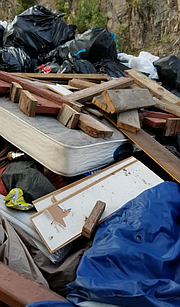Changes are on the way
KINGSTON — Ongoing issues along the North Fork have prompted local officials to waive a white flag in regard to the use of the dumpsters that have been placed along the river.
For now.
After numerous attempts to convince river-goers (of all types, local or out-of-town), that the dumpsters were placed specifically for those camping and recreating along the river and not for everyday, household trash and refuse, the Shoshone Board of County Commissioners is simply asking that those who are using the dump sites do so respectfully and responsibly.
While the primary debate among local residents is that the dumpsters are funded through county tax dollars, that simply is not the case as the dumpsters are funded through United States Forest Service Resource Advisory Committee grants.
The funding misconception has fueled many people to use the dumpsters to dump things like household trash, appliances, and other non-camping, non-recreation type garbage despite pleas from the county and the trash service.
These grants have helped fund the dumpsters, the restrooms, the police and road striping, but the county will now be exploring some other options to generate revenue in the area in hopes of curbing the current issue.
“Hopefully, by this time next year, we will have a revenue stream coming in from what we are calling recreational properties,” said Mike Fitzgerald, BOCC chairman. “Once we do that, we can take it to the next level and define it by how many camping spots are at each site. To do that though, we will need to have that initial revenue stream so that we can afford to use some newer technology, like flying a drone over the properties to see how many camping sites each property has.”
The county will then be able to tax each recreational property based on the number of campsites and lots being utilized on each property, and have photographic evidence to fall back on should anyone have any disputes.
For example, a property owner with an acre of property, who divides it up into four or five different spots would be responsible for ensuring those spots’ fees are paid each year.
These fees imposed will go toward funding things like the dumpsters, as well as better enforcement.
For the time being, the BOCC appreciates the responsible use of the dumpsters and hopes that people will continue to use it respectfully.



